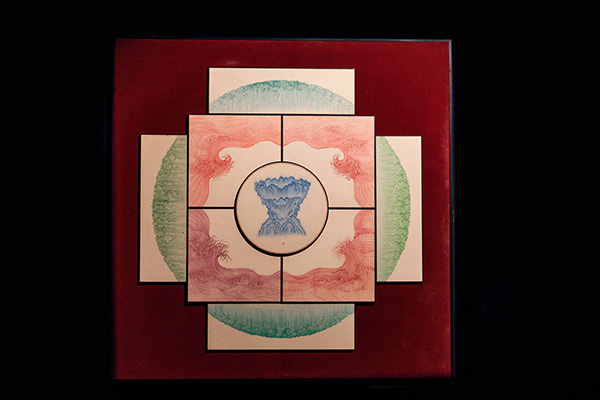 |
|
About 30 works were displayed during the exhibition organized by Tihho, a business that works to promote Tibetan art and culture outside the region.[Photo provided to China Daily] |
Cultural bridges
Fang, who was born in 1984, is from the Gannan Tibet autonomous prefecture in Gansu province. The young Tibetan studied in Beijing, throwing himself into his academic work and becoming involved in social organizations, but he never forgot his love of ethnic art and culture or his dream of starting his own business.
After graduating from Peking University, he worked for the National Committee of the Chinese People's Political Consultative Conference, the top political advisory body, researching policies related to the nation's ethnic groups and handling public relations with neighboring countries.
"In that job, I noticed that many people were deeply curious about Tibet, but I realized that in their eyes Tibetan culture and art still revolved around old thangka - religious paintings - and figures of the Buddha. It was then that I had the idea of promoting Tibetan arts and culture in a modern, internationalized way," he said.
"At the same time, some people told me about their concerns regarding the protection of our traditional culture. I think we should take action, rather than just expressing concern," he said, adding that the best way to protect the culture is to raise awareness and promote it effectively.
In early 2014, he quit his job and co-founded the Tihho Cultural and Art Center in Lhasa, achieving his dream of starting his own business.
Tan Weimin, who owns a multifunctional inn in Lhasa, shares Fang's opinion. "The region's culture needs to go global, while some advanced business management styles could also be brought in from other parts of China," said the 32-year-old native of Guangyuan, Sichuan province.
"I'd like to be a bridge for cultural exchanges."
After graduating from Beijing Jiaotong University in 2009, Tan worked in large cities such as the capital and Jinan, Shandong province, but the heavy workload left him exhausted and feeling lost.
In 2012, he resigned from his job in Beijing and began traveling around the country by bike. "My destination was not Tibet. I just wanted to relax and see friends when I passed their hometowns," he recalled.
However, after receiving assistance from several Tibetans he met on the road and staying in Lhasa for several months, he decided to settle in the city in 2013. "I found the people, culture and business environment were all inclusive," he said.
Tan has a passion for reading, but he found there were few libraries in Tibet. In April 2014, he opened a bookstore in Lhasa, regarding the move as the first step in a cultural exchange.
"I knew I'd made the right decision, especially when I noticed an elderly Tibetan man who often came to the bookstore to read and borrow books," he said. "It meant the business met local people's demands."